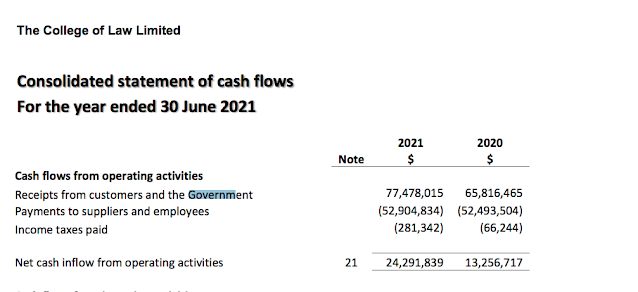"Carbon tax", "emissions trading cap" simply different names for Ken Henry's 100% "super profit" tax?
by Ganesh Sahathevan

In 2010 the highly regarded Dr Kenneth Henry, then Secretary Department Of Treasury, decided that miners were making too much money. He proposed taxing at penalty rates any return on capital that he decided was "excessive". He even suggested that his brilliant idea should apply to all industries. The AFR reported:
Treasury secretary Ken Henry says future governments will need to consider taxing all companies, including powerful banks and retailers, only on their above-normal profits under a system similar to the resource super profits tax.
The resources business is very high risk; a 10% probability of success in finding anything is considered high. Can anyone see any reason to invest anything if the Government is to be entitled to even 70% of "super profits"?

In 2010 the highly regarded Dr Kenneth Henry, then Secretary Department Of Treasury, decided that miners were making too much money. He proposed taxing at penalty rates any return on capital that he decided was "excessive". He even suggested that his brilliant idea should apply to all industries. The AFR reported:
Treasury secretary Ken Henry says future governments will need to consider taxing all companies, including powerful banks and retailers, only on their above-normal profits under a system similar to the resource super profits tax.
In an address to tax professionals, Dr Henry said that, as the global economy further integrated, a shift to a corporate tax system based on an “allowance for corporate equity", whereby only above-normal profits would be taxed, was worthy of serious investigation.
Under such a system, highly profitable companies – particularly those operating in less-competitive oligopoly markets like banking – would pay more tax, experts said.
The Henry report, drawing on the thinking of leading international tax academics, recommended Australia stick with its current corporate tax system for the near term but consider introducing a new system in the longer term.
In a candid question and answer session after the prewritten speech, Dr Henry said it was “unbelievably frustrating" that debate from public policy experts over the detail of major proposed reforms could cause the policy to fall over, even if most supported the broad principle. To say [an] emissions trading scheme is not a bad idea but a carbon tax would actually be better, for example, doesn’t increase at all the chances of a carbon tax being legislated," Dr Henry said.
“All it does is reduce the chances of the proposed reform."
Afterwards, Henry went on to a stellar career as chairman of the NAB( see photo and caption above). Today his proposed "reforms" are still considered by some to be a lost opportunity. It is not hard to see why, given this exchange:
When taxes cause us to change our behaviour, that results in economic costs.
Yet tax theorists have long been aware that taxes do distort behaviour.
A key aim of tax design is therefore to limit the extent to which taxes change our behaviour:
A generally accepted ‘rule of thumb’ for tax policy is that the economic costs of a tax
are larger the more responsive demand or supply is to a change in price.
Accordingly, the more efficient taxes tend to be those that apply to markets with
relatively less responsive supply and demand, because a change in the rate of tax will
have a more limited impact on the efficient allocation of economic resources.
That economic backdrop means that tax economists and economic modellers have
increasingly focussed in recent years on ‘the mobility principle’: in essence, the view that, if
what is being taxed cannot ‘move’, then it can be taxed at very high rates with no damage
to incentives, and hence no damage to behaviour.
Hence ‘resource rents’ – the return to the minerals themselves – are seen as a logical tax
base, as the minerals can’t move in response to higher tax rates.
As the then Treasury Secretary, Ken Henry, argued in testifying before a Senate committee
on 27 May 2010, those tax rates could be very high indeed. When asked “if we took the
[Resource Super Profits Tax] rate to 70 per cent or 80 per cent would that make a
difference?”, he replied “In concept it should not make a difference.”
When pressed further, “What if it went to 100 per cent?”, Dr Henry replied “At 100 per cent
we might find that the government had to finance all of the investment itself. I do not want
to make too much of this, but other countries—take Norway, for example—have managed
to attract very substantial amounts of private capital investment while taking 95 per cent of
the profits (the matter of Norway will be addressed in future story, but suffice to say that Australia is nowhere near as prospective as Norway).
The resources business is very high risk; a 10% probability of success in finding anything is considered high. Can anyone see any reason to invest anything if the Government is to be entitled to even 70% of "super profits"?
While considering your answer readers, consider this: does anyone not agree that once a "carbon tax" is introduced, governments here cannot help but keep increasing it to a point where Henry's dream of a 100% tax rate will become a reality?
When it does, you will pay for it.
END


Comments
Post a Comment